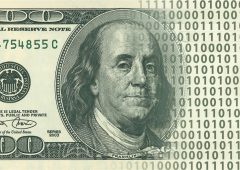Bank of America Sees Gold as Top Safe Haven Amid Fiscal Uncertainty
18.10.2024 14:00 2 min. read Alexander Stefanov
Bank of America is spotlighting gold as a preferred safe haven over bonds, citing rising global fiscal uncertainties.
The bank believes that gold’s appeal has strengthened amid fiscal challenges and persistent inflation concerns, making it resilient even if interest rates climb, which typically suppresses the metal’s value. This marks a shift in how gold interacts with economic conditions.
Though not explicitly referencing cryptocurrencies, Bank of America’s actions suggest a cautious engagement with digital assets. Since February, its wealth management branches have offered Bitcoin ETFs to certain clients, highlighting a growing interest in crypto despite the bank’s historically careful approach. Meanwhile, its involvement in blockchain-related projects continues to expand.
With U.S. debt levels surging and inflation proving stubborn, gold’s status as a hedge against economic instability is solidifying. The bank projects the metal could reach $3,000 per ounce, driven by anticipated government spending hikes, particularly in defense and climate sectors. Even as short-term fluctuations may challenge gold’s rise, analysts expect it to hold firm around the $2,000 mark.
Central banks’ gold reserves have surged over the last decade, while demand has risen in Western markets despite China’s recent import slowdown. Gold’s safe-haven allure is being reinforced as macroeconomic risks grow.
On the other hand, Bitcoin’s reputation as a “digital safe haven” is gaining traction due to its decentralized framework and capped supply, positioning it as an alternative to traditional assets like gold. While Bank of America has yet to fully embrace Bitcoin, its exploration of blockchain technology through platforms such as the Paxos Settlement Service indicates an ongoing evaluation of the digital asset landscape.
For now, the bank’s approach to crypto remains cautious, but the increasing integration of digital assets into mainstream finance signals a shift worth watching.
-
1
Binance Could Introduce Golden Visa Option for BNB Investors Inspired by TON
07.07.2025 8:00 1 min. read -
2
U.S. Dollar Comes Onchain as GENIUS Act Ushers in Digital Era
20.07.2025 17:56 1 min. read -
3
Weekly Recap: Key Shifts and Milestones Across the Crypto Ecosystem
06.07.2025 17:00 4 min. read -
4
Trump Imposes 50% Tariff on Brazil: Political Tensions and Censorship at the Center
10.07.2025 7:00 2 min. read -
5
USA Imposes Tariffs on Multiple Countries: How the Crypto Market Could React
08.07.2025 8:30 2 min. read
Strategy to Raise Another $2.47 Billion for Bitcoin Acquisition
Strategy the company formerly known as MicroStrategy, has announced the pricing of a new $2.47 billion capital raise through its initial public offering of Variable Rate Series A Perpetual Stretch Preferred Stock (STRC).
AI Becomes Gen Z’s Secret Weapon for Crypto Trading
A new report from MEXC reveals a striking generational shift in crypto trading behavior: Gen Z traders are rapidly embracing AI tools as core components of their strategy.
3 key Reasons Behind Today’s Crypto Market Drop
The crypto market shed 1.02% in the past 24 hours, led by a sharp Bitcoin drop and fading altcoin interest.
FTX Sets Next Data for Creditor Distribution
FTX Trading Ltd. and the FTX Recovery Trust have announced August 15, 2025 as the official record date for their next round of distributions.
-
1
Binance Could Introduce Golden Visa Option for BNB Investors Inspired by TON
07.07.2025 8:00 1 min. read -
2
U.S. Dollar Comes Onchain as GENIUS Act Ushers in Digital Era
20.07.2025 17:56 1 min. read -
3
Weekly Recap: Key Shifts and Milestones Across the Crypto Ecosystem
06.07.2025 17:00 4 min. read -
4
Trump Imposes 50% Tariff on Brazil: Political Tensions and Censorship at the Center
10.07.2025 7:00 2 min. read -
5
USA Imposes Tariffs on Multiple Countries: How the Crypto Market Could React
08.07.2025 8:30 2 min. read


